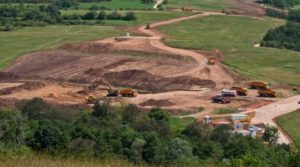Nevsun says Timok Lower Zone is world class

Nevsun's Timok copper-gold project in Serbia. Source: Nevsun Resources Ltd.

Nevsun Resources Ltd. [NSU-TSX; NYSE American], the target of a takeover proposal by Euro Sun Mining Inc. [ESM-TSX, CPNFF-OTC] and Lundin Mining Corp. [LUN-TSX; LUMI-Sweden], on Tuesday June 26 announced the initial resource for the Lower Zone deposit at its Timok copper-gold project in Serbia.
With this news now out in the open, there could be some renewed progress in the current standoff between Nevsun and its would-be suitors Euro Sun and Lundin Mining, Scotiabank said in a research report. Nevsun advanced on the news, rising 0.70% or $0.03 to $4.34 on volume of 480,110 in early afternoon trading Tuesday.
The Timok Lower Zone deposit is a joint venture with Freeport McMoran Exploration Corp. In a press release Tuesday, the company announced an initial inferred resource for the Lower Zone of 1.7 billion tonnes, grading 0.86% copper and 0.18 g/t gold, containing 31.5 billion pounds of copper and 9.6 million ounces of gold at a US$25 cut off. That includes 1.1 billion tonnes, grading 0.99% copper and 0.21 g/t gold (1.11% copper equivalent at a US$45 cutoff, the company said.
“The Timok Lower Zone ranks high among world porphyry deposits by tonnage and grade,” said Nevsun CEO Peter Kukielski. “With 1.1 billion tonnes, grading 1.11% copper equivalent, the Timok Zone benchmarks well against planned and operating block cave mines. We will continue to work with Freeport to determine next steps for advancing the Lower Zone,” he said.
Kukielski went on to say that Timok is the start of a new generation of mines in Serbia’s Bor region.
An initial reserve for the Upper Zone was released in March 18. It contains an estimated probable reserve of 27 million tonnes at an average grade of 3.3% copper and 2.1 g/t gold, containing 0.89 million tonnes of copper and 1.8 million ounces of gold. The Upper Zone pre-feasibility study foresees a 10-year mine life, producing 1.7 billion tonnes of copper annually.
Nevsun is a leading mid-tier base metals company. It operates Bisha, a high grade open pit copper-zinc mine in Eritrea and is developing the Timok copper-gold project. Timok is located in the historic Bor mining district and benefits from close proximity to existing mining infrastructure.
The company is the target of a high profile proposal that would see Euro Sun acquiring 100% of Nevsun. Upon acquisition of the Nevsun shares, Euro Sun would then vend Nevsun’s European assets, including the Timok Project, into Lundin. This would leave the producing Bisha Mine in Eritrea as Euro Sun’s principal asset.
Published reports say the proposal has been structured this way because Lundin Mining covets the Timok copper-gold project but its board of directors isn’t keen on investing in Eritrea, where the Bisha Mine is located.
However, Nevsun recently rejected the $1.5 billion takeover proposal. It said the unsolicited offer was dated April 30, 2018 and made public by Euro Sun and Lundin on May 7, 2018.
“The Nevsun Board of Directors is unanimous in its belief that the non-binding unsolicited proposal fails to reflect the strategic value of our asset base,” said Ian Pearce, Chair of Nevsun’s Board of Directors.
“The non-binding unsolicited proposal also presents a problematic structure that could further undermine value to shareholders,” he said.
Still, a senior official at Nevsun’s second largest shareholder M&G Investment Management, recently said the $1.5 billion takeover proposal from Lundin and Euro Sun looks “pretty fair.”
“Nevsun should engage more fully with Lundin Mining and Euro Sun Mining, which made the proposal and run a full sales process,” said Jamie Horvat, director of global equities for M&G Investment Management, which owns 9.5% of Nevsun.
On June 25, the Star Metro Vancouver newspaper reported that the Supreme Court of Canada has granted Nevsun an appeal in a court case regarding the company being accused of human rights violations at the Bisha Mine which it vehemently denies. Nevsun has argued that the case should not go to trial. The mine is 60% owned by Nevsun and 40% by the Eritrean government.
